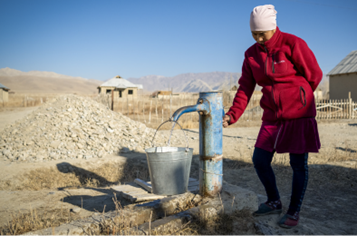Perspectives from the Frontline: How Kompanion Bank, Kyrgyzstan is dealing with the COVID-19 crisis
- May 28, 2020
- 3 min read
Updated: May 16, 2024
Author: e-MFP.
As part of our efforts to understand the impact of the COVID-19 pandemic on microfinance markets around the globe, e-MFP reached out to Kompanion Bank in Kyrgyzstan, a good and long-time friend of e-MFP, having been a winner of the European Microfinance Award in 2014. Via an email exchange, Margarita Cherikbaeva, CEO, brought us up to speed on the situation on the ground.

e-MFP: What is the current public health and economic situation in your country regarding COVID-19?
Margarita Cherikbaeva (MC): As of morning May 20, there were 1,322 coronavirus infection cases in Kyrgyzstan, 37 cases for the last 24 hours. 949 people recovered (68.3% of the total number of registered COVID-19 cases). Analysis shows a downward trend starting from April 16. An increase was observed from April 5 to 20. The highest numbers were registered on April 11-12. The number of cases has started to decrease since end of April.
Regarding the impact of COVID-19 on the economy of the Kyrgyz Republic, the Ministry of Economy projects a 6.8% decline in the annual GDP due to self-isolation. The weakening of national currencies in Q1 2020 may place some pressure on the cost of imported goods, which will be the main reason for rising inflation in 2020. There is a high level of uncertainty in economic prospects. The macroeconomic forecast for Kyrgyzstan highly depends on the pandemic development trends.
e-MFP: How have you supported clients and staff during this crisis?
MC: The pandemic has had a strong negative impact on medium and small-size businesses that represent about 40% of the country’s economy. In view of the current economic situation caused by COVID-19, the Bank has come up with supporting lending programs to restart businesses and help entrepreneurs maintain the liquidity of their commodities and inventory. To alleviate the financial burden for customers, the Bank has started to provide a 3-month grace period with individual review of loan agreement conditions and repayment schedules. So far, the Bank has offered loan restructuring to 11,700 clients totaling KGS 1 billion 611 million.
To ensure an uninterrupted access to financial services and to support customers, the Bank continues to operate in all regions and “hotspots” of the country so that people have access to their bank accounts and have an opportunity to conduct all required transactions. Currently, the Bank is actively working towards a full-scale renovation of its remote banking services and is taking efforts to integrate new solutions together with prominent banks in the CIS.
To protect staff, the Bank has arranged special transportation and provided for all required personal protection equipment. The Training and Development Department of Kompanion Bank developed the training on effective remote work that helped employees come to terms with the remote working mode.
Further, Kompanion Bank donated KGS 2 million to combat COVID-19 and has been actively sensitizing the population to the safety measures that help reduce the spread of COVID-19. Bank employees supported this initiative and additionally donated their one-day pay to support the vulnerable.
e-MFP: What kind of support (financial or otherwise) have you received from your investors, funders and any other relevant partners?
MC: Having considered the requests related to the COVID-19 consequences, Kompanion Bank has received new funding conditions from some of its partners and investors. Despite the fact that funds have become more expensive, it’s important that we can have access to liquidity, which is crucial for ensuring the sustainability of banks during this time.

e-MFP: What coordinated response have policy-makers, financial supervisors or networks taken to protect the financial inclusion sector in your country?
MC: As part of the set of measures supporting the sectors of economy and entrepreneurs (worth KGS 40 billion), the Government has developed an action plan for 2020 to restart economic activity and assist businesses. The plan envisages 21 measures, including 15 financial and fiscal measures to support entrepreneurs and 6 administrative support measures.
e-MFP: What do you see as the top priorities to support and protect your clients from the economic consequences of the Covid crisis?
MC: Consistent with its Mission, Kompanion Bank provides socially responsible financial services contributing to greater economic and social well-being of clients and communities and environmental protection. In pursuance of the Mission, in 2010, the Bank established a special-purpose in-house Community Training & Support Department consisting of 30 accomplished agronomists and veterinarians. They provide consultations and free trainings to farmers living in the remote regions of the country. The Bank continues to carry out social projects to support people.
In addition, we continue to provide deferrals and loan restructurings, as well as move forward with expanding our digital channels to provide tailored services to our customers.





Comments